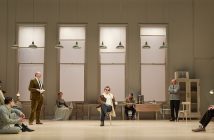Expectations could not have been higher for Tom Stoppard’s new play. It represents a series of firsts – ‘first stage play since 2006; first play at the National since 2002; first collaboration with Nicholas Hytner’ – as well as a last – Hytner’s swansong as the NT’s artistic director. And, of course, Stoppard is now 77; while one hopes that there are more plays to come, it is never guaranteed, especially as rumours of writer’s block have circulated. Not, of course, that he’s been anything but busy, with adaptations of Parade’s End and Anna Karenina and a radio play based on Pink Floyd’s Dark Side of the Moon. Nonetheless, his return to the stage has been the theatrical event of the year, perhaps even the decade. And it gives me – a Stoppard aficionado through and through – no pleasure whatsoever to report that it’s his weakest play in years, possibly ever, a dull, half-baked assemblage of random ideas without much dramatic coherence. It is inevitably sold out and has garlanded a few glowing reviews from the devoted, but most will find it a massive, crushing let down.
One of the problems that The Hard Problem has is that it doesn’t really have a central plot. For a writer normally so brilliant at yoking disparate ideas together (chaos theory and Byron in Arcadia; AE Housman, the classics and Oscar Wilde in The Invention of Love, etc), it feels as if Stoppard has attempted to write two plays based around interesting main characters, abandoned them both, and then rather half-heartedly yoked them together in diluted form. The dominant one concerns Hilary (Olivia Vinall), a young psychologist whose attempts to answer the titular problem of what consciousness actually means are complicated by her religious faith which, as the play goes on, seems to represent less a spiritual dimension and more of a practical one. The other, tangentially related, concerns Jerry (Anthony Calf), Hilary’s boss at the brain institute where she works; Jerry can best be described as a ruthless philanthropist, a billionaire hedge fund magnate who has invested in scientific exploration with just as much demand for results as he plays the market.
Either of these could have made for an interesting story, but as it is they are swamped by cardboard cut-out characters who are given apparently random personality traits and forced into the demands of a series of events that fail to compel. (Without wishing to spoil what amounts to a plot twist, there is a central dramatic development that’s so hackneyed that even the protagonist notes its absurdity early on.) And, most unforgivably, the script doesn’t sparkle. Early on there are a few clever-clever lines – one about tutors sleeping with students, another about the fundamental selfishness of Raphael’s ‘Mother and Child’ painting – that at least show that Stoppard’s own brain consciousness has been partly engaged, but as the play drifts on, scenes become instead battlegrounds for not wildly interesting scenes of debate with cyphers. A man who I thought was incapable of writing a boring play has done just that.
There is nothing wrong with Hytner’s production, which, aided by Bob Crowley’s witty design of a tangled mass of electrodes that represents brain activity, is fluid, decently acted and frequently gives the impression that the action on stage is far more important and natural than it actually is. Vinall, who has appeared in prominent roles as two of the great Shakespearean victims – Cordelia and Desdemona – here finally comes into her own, being reminiscent of a slightly younger Hattie Morahan in her combination of luminous passion and spiky intelligence, and very nearly makes Hilary an engaging protagonist. Supporting roles, as ever with the National, are all well cast, although I didn’t buy Damien Molony as her rationalist former tutor-cum-occasional lover Spike, not least because few academics sport such enviably buff torsos, as frequently seen in a state of virtual nudity. Calf seems on the verge of creating a really memorable character as the half-pragmatic, half-vile Jerry, but is saddled with an unconvincing American accent and some strange last-minute changes of heart. Would that all hedge fund ‘masters of the universe’ could be softies deep down underneath.
It gives me no pleasure at all to run down a play by someone I admire so enormously as Stoppard. I even wrote my dissertation on him while a student, and so come to his works as both an admirer and a critic, just as some battered paperbacks signed by him are amongst some of my most treasured possessions. If this personal revelation seems unnecessary in a theatre review, then it’s only as a way of explaining how let down I felt upon leaving the theatre (as, judging by conversations I heard snatches of, most of the audience around me did). And then I walked outside, and snow was lightly falling, and couples were walking around on the South Bank, and my disappointment gave way to a philosophical disengagement. It’s just a play, after all, and a relatively short one (100 minutes, without interval), and it’s hardly the worst or most offensive thing I’ve ever seen. But I hope – desperately – that this isn’t Stoppard’s own farewell to theatre, and that he has a final, great play left within him, something to show that a man who can, without exaggeration, be described as ‘the greatest English-language playwright since Shakespeare’ is capable of the giddy exultation of great drama, rather than the semi-tumescent slog of a missed opportunity here.
Until May 27th 2015. For more information and tickets, visit the website. NT live screening on April 16th at 7pm – details here.




